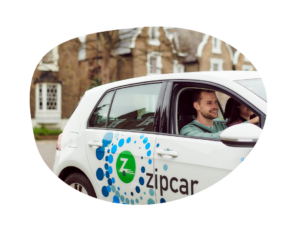

“Fare wars” would be a much less likely occurance.


Airlines would still compete for business on price, but in different ways.

You’d only be able to buy fares from those companies where you held a membership. Imagine if airlines operated similarly: Before booking a trip, you would have to buy a membership with the airline. If a potential customer lacks either of these, he or she is ineligible for the service.
#Zipcar rates license#
In the case of Zipcar, a potential customer must submit an application that shows that they have a driver’s license and have committed no serious infractions behind the wheel. Even so, “fare wars” occasionally drive prices down and yield great deals for consumers.Ĭar sharing is unlike air travel in one key way: customers are screened for safe driving records, and must be a member of a given company to use its cars. The air travel industry is dominated by a small number of firms and barriers to entry are extremely high. Consider the case of a well-known oligopoly: airlines. In an oligopoly, this is also true to an extent. In a perfectly competitive market, competition among firms brings down prices. Oligopoly industries are notorious difficult to understand, and game theory scholars have stepped into help explain why these firms behave the way they do. Oligopolies share an important characteristic with monopolies: firms price goods and services not based simply on supply and demand, but in the way that maximizes their revenue, while taking into consideration how their competitors behave. In the case of car sharing, the high capital costs of vehicles and technological infrastructure make it very difficult for all but a few firms to enter the market. The car sharing market will soon morph into an oligopoly: an industry dominated by a handful of businesses and has high barriers to entry. The prospect of three new competitors is welcome news to those who believe competition will benefit all concerned. Consumers tend to think poorly of businesses that operate as monopolies, even if such firms can take advantage of efficiencies and pass the benefits down to customers. Since acquiring Flexcar in 2007, Zipcar has been the only car sharing game in town. Zipcar currently enjoys monopoly status in DC. Economic theory suggests that the impact on prices and service might not be as large as some hope.
#Zipcar rates driver#
This ticket serves to provide a clear indication to all Port staff that the driver has a customer that needs to be dropped-off or picked-up in an alternative location and it may expedite the process.Recent news that Zipcar is losing some of its coveted on-street spaces in DC has sparked discussion about how new competition might impact the region’s car-sharing network.
#Zipcar rates drivers#
Please state clearly to your ground transportation service provider that you require mobility assistance to ensure they meet or deliver you to one of these locations.Īlthough drivers are not required to, they may elect to stop by the hold lot or commercial roadway booth to obtain a ticket to place it in their windshield prior to dropping you off at the inner roadway. Passengers in a wheelchair or with limited mobility may also request drop-off on the upper level (Departures/Ticketing) inner roadway.
#Zipcar rates free#
Alternatively, please feel free to contact the Port’s Ground Transportation Office at 50 or by e-mail at depart from the Baggage Claim (lower) level outer roadway, which is accessible by wheelchair. To request a wheelchair taxi, please contact PDX WAV at 503-865-4WAV (50) 24-hours a day, 7-days a week, or by using your TNC app on your wireless device.įor more information about the PDX WAV program, please email the Portland Bureau of Transportation at or call 50 with your questions and comments. Ground Transportation Providers drop off on the departures level, or a location most convenient for the passenger. Taxi and other transportation network companies (“TNC”) such as Uber and Lyft are available to take you to and from the airport using wheelchair accessible vehicles.


 0 kommentar(er)
0 kommentar(er)
